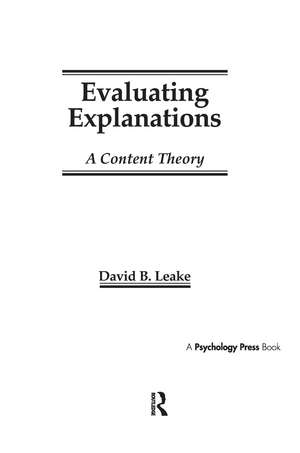Evaluating Explanations: A Content Theory: Artificial Intelligence Series
Autor David B. Leakeen Limba Engleză Paperback – 2 sep 2016
The author of this volume, however, argues that explanation-based learning research has neglected key issues in explanation construction and evaluation. By examining the issues in the context of a story understanding system that explains novel events in news stories, the author shows that the standard assumptions do not apply to complex real-world domains. An alternative theory is presented, one that demonstrates that context -- involving both explainer beliefs and goals -- is crucial in deciding an explanation's goodness and that a theory of the possible contexts can be used to determine which explanations are appropriate. This important view is demonstrated with examples of the performance of ACCEPTER, a computer system for story understanding, anomaly detection, and explanation evaluation.
Preț: 325.34 lei
Preț vechi: 379.25 lei
-14% Nou
Puncte Express: 488
Preț estimativ în valută:
62.25€ • 65.00$ • 51.41£
62.25€ • 65.00$ • 51.41£
Carte tipărită la comandă
Livrare economică 15-29 aprilie
Preluare comenzi: 021 569.72.76
Specificații
ISBN-13: 9781138969162
ISBN-10: 1138969168
Pagini: 274
Dimensiuni: 152 x 229 mm
Greutate: 0.45 kg
Ediția:1
Editura: Taylor & Francis
Colecția Psychology Press
Seria Artificial Intelligence Series
Locul publicării:Oxford, United Kingdom
ISBN-10: 1138969168
Pagini: 274
Dimensiuni: 152 x 229 mm
Greutate: 0.45 kg
Ediția:1
Editura: Taylor & Francis
Colecția Psychology Press
Seria Artificial Intelligence Series
Locul publicării:Oxford, United Kingdom
Public țintă
ProfessionalCuprins
Contents: Explanation and Understanding. Perspective on the Theory. Anomalies and Routine Understanding. Pattern-Based Anomaly Detection. Anomaly Characterization. A Vocabulary for Anomalies. Nonmotivational Anomaly Types. Evaluating Relevance and Plausibility. Focusing on Important Factors. Conclusions and Future Directions.










